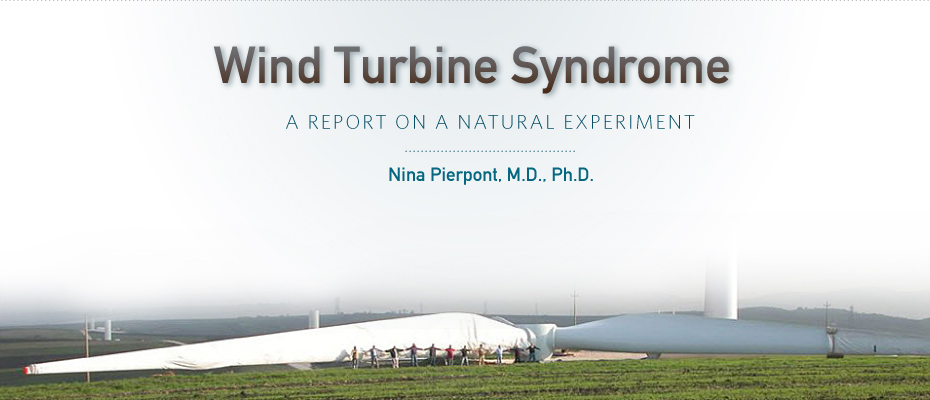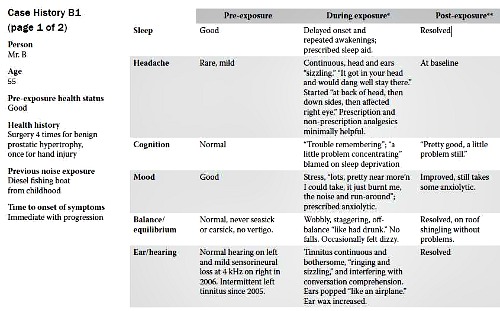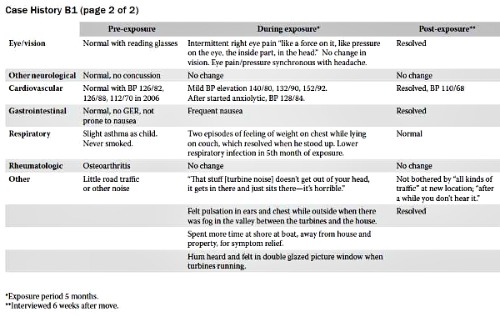Wind Turbine Syndrome: “In their own words”
Dec 17, 2010
Congress just sent an $801 billion tax cut bill to President Obama for his signature. Obama will sign it into law. At the last minute, as a result of carpet-bomb lobbying and dire prophecies by the American Wind Energy Association, Democrats inserted language into the bill to extend the huge, absurd, direct federal subsidy for wind energy projects—guaranteeing Americans at least one more year of The Great Wind Energy Opera.
This means that you, dear reader, may wind up contemplating a wind turbine or two near your home, soon.
Should this happen, you’re doubtless going to hear (probably for the first time) the phrase “Wind Turbine Syndrome,” as your community debates this so-called “wind farm.” (It’s not a “farm”; it’s a major industrial plant.)
You will soon make an interesting connection. The people who have signed leases with the wind developers consider Wind Turbine Syndrome to be so much moonshine. As a Brewster, MA, town officer recently put it, “hogwash.” (Note: These “WTS = moonshine” experts signed those leases long before you were apprised of this whole project, but that’s a scandalous story for another day.)
Of course, the moonshine crowd has zero credentials, or, for that matter, any real knowledge of what Wind Turbine Syndrome in fact is. (Frankly, they wouldn’t know a syndrome from a Las Vegas hooker. Or a peer review from their pudenda.) They heard it’s moonshine from the wind developers—and that’s good enough for them.
But I digress. The point is, you’re looking down the barrel (a very large barrel!) of a wind turbine—maybe lots of them—and wondering if these things really, honest-to-god make people sick.
Short answer? Yes, they do. Sick enough that many either sell their homes (if they can), or they raise enough hell with the developer that the company (secretly) buys them out, or they abandon their home. (Lock the door and drive away. No kidding.)
Many more sit tight and suffer. And, since they haven’t read Pierpont, they can’t figure out why they’re getting pounding headaches and awakening at night in a panic, and why they feel like puking and get dizzy and have ringing (tinnitus) or pressure in their ears and feel like their insides are crawling, and—for the life of them—why they’re forgetting things, and can’t do many formerly mundane, even trivial tasks that require spatial thinking and spatial reasoning. And why they and their kids are getting depressed and enraged—and, some people, suicidal.
Early Alzheimer’s? Nope. Wind Turbine Syndrome.
But you don’t want to hear it from me, right? You want to hear their beef in their own words, right? (Let’s call it the “unvarnished beef.”)
Pierpont gives it to you—yes, in their own words. Sixty-seven pages of it. Sixty-seven pages of what’s called, in medicine, “case histories.”
They look like this (click here).
Get Pierpont’s book and start reading those 67 pages.
In the remaining 230 pages, Pierpont explains the likely patho-physiology of their beef, which, incidentally, Big Wind (WIND) says is nothing more than, well, garden-variety hysteria. “They’re making it up,” in other words. WIND (“Why I Need Dollars”) calls it a “nocebo” effect. WIND seized on this risible explanation after it hired some shills to write a rebuttal to Pierpont’s research.
Oh, I almost forgot to mention. The big fight in this whole mess is between WIND and NIMBY. “Why I Need Dollars” versus “Not In My Back Yard.” The WINDies want, um, the dollars, and for that they’re going to make all sorts of righteous speeches about “getting off Arab oil” and “global warming” and “doing our part” and “bringing home the troops” and “Wind Turbine Syndrome is bullshit” and “cats kill more birds than turbines” and “jobs jobs jobs” and “green economy” and so forth. You get the idea. The NIMBYs don’t want the turbines because they devastate their property value, industrialize the neighborhood, make many people seriously ill, do nothing for global warming and energy independence and the jobs are short-lived and wind energy raises your electricity bill, and so forth.
But I’ve digressed once more.
When you’re done reading the case histories, ponder this: Virtually everyone in these 67 pages moved out of their home. (Do people really, truly move out of their homes—or abandon them—over something they made up?)
Finally, this. There are thousands of people around the world who describe the identical cluster of symptoms—symptoms that started when the turbines went online, symptoms that disappear when people go away for several days, symptoms that reappear when people return home. Symptoms that steadily, insidiously worsen over time, because you can never “get used to” the patho-physiological jack-hammering of infrasound. (Sorry, my friend, the body just doesn’t work that way.)
Moonshine? You’ve got brains and you’ve got common sense and you’re an adult. You decide.




Comment by Frank Haggerty on 12/18/2010 at 1:05 pm
The residents of Brewster, Mass., on Cape Cod are fortunate to have had so many dedicated and inquisitive residents in their midst who were willing to research the subject—and to take action to warn their neighbors, despite the negative blowback which they had to endure. Unfortunately, this seems to be an occupational hazard for anyone who dares to call attention to the fact that:
a) these projects accomplish nothing useful in terms of reducing green house gas emissions;
b) they are a blight upon the landscape and an environmental disaster for wildlife and human inhabitants, sowing misery and despair wherever they are installed; and
c) they inevitably divide communities into bitter factions; and
d) the tragic mistake of building them, once committed, is irreversible.
We need to ask why the residents of Falmouth, Mass., have to live in their basements because the wind turbines are so loud !
The country has evidently arrived at a point in its legal culture where no negative consequences seem to exist for making false or misleading claims to sell wind energy—the stuff dreams are made of. But industrial wind is a bunco scheme of enormous consequence. And people who value intellectual honesty should not quietly be fleeced by such mendacity, even from their government.
Comment by Quixote on 12/18/2010 at 1:38 pm
Sad days for humanity when the clowns that call themselves “leaders” go to bed with the investors in order to pump up their bank accounts. What’s worse are the “leaders” which actually worship Gaia and spout never-ending eco-religious platitudes which in turn subjugates the masses and promotes the UN Agenda 21 to take over complete control of all societies that show any signs of “enlightenment”.
Information and knowledge will defeat these maniacs…..we just have to hurry up the learning process!……
Well done Calvin……..The truth will set us free!
Comment by Tom Whitesell on 12/18/2010 at 4:45 pm
I like your use of the term “carpet-bomb lobbying”. Also, are (what you refer to as) “case histories” also known by a potentially somewhat more derogatory term “anecdotal”?
Hmm. Maybe Homeland Security should take on the Wind Industry. Aren’t the folks commenting (above), along with all the thousands of folks all over the world, referring directly and blatantly to their loss of security in their homes, and land, in their homelands? Having, even, to flee their homes in the face of an aggressor, an invader, who through stealth and deception, corruption, and effectively forced takover, has made life untenable in familiar surroundings?
Editor’s reply: “Case history” is an old, venerable clinical term. Typically, a new disease (or, before it becomes clearly identified as a disease, it’s called a “syndrome”) is explored initially in a collection of case histories—just as Dr. Pierpont did with Wind Turbine Syndrome. Big Wind, in its fabulous imbecility, derides “case histories” as “anecdote.” Wind turbine salesmen don’t grasp that all of medicine is based on case histories; these are the foundation of all clinical knowledge of a new disease. If you were to read through the New Eng. Jour. of Medicine, for instance, you fill find loads of case histories. This is what medicine does; this is how it moves forward. In fact, when you go to your doctor and sit there and he/she starts questioning you, and taking notes, he’s taking a case history. Without case histories, medicine goes “poof”! It vanishes! To deride “case histories” is like deriding the gas that makes your car run.
Comment by Jane in North Gower on 12/21/2010 at 9:13 am
This news means that rural USA, like rural Ontario, Canada, is now not safe to live in; no matter where you go, the industrial wind turbines can pop up. And you have nothing to say about it. Legislation that once protected beautiful QUIET areas of the countryside has now been trampled, and our communities are powerless.
When this is over, it will be the most horrific story of big business rolling over the rights (and health) of ordinary people.
Comment by Ann Ihrke on 02/26/2011 at 3:23 pm
It is even worse than this article can portray. The once beautiful rural land has been turned into industrial parks, creating havoc with the environment, wildlife and humans as stated. And all for what? We still need nuclear and coal—so no carbon reductions, we will pay triple for our electric power, property values tumble, and we as taxpayers are the big losers as usual. Without the subsidies these monsters will go away.
Write to your representatves and your senators and ask them to defund 1603 cash grant progam and bring this scam to a rolling halt. Only our continued harassment of governing bodies will stop this insanity.
What diid Lincoln say? “You can fool some of the people . . . .” There cannot be that many uninformed people—or are there?
Ann Ihrke
Comment by How About Truth on 03/02/2011 at 9:34 am
The unreasonable intrusion of industry into our countryside is a symptom of a bigger problem. People are now so uninformed, and so uninterested, they no longer seek truth, instead relying on crafted messages coming from the crafters.
Big industry controls the message and the outlets that spew their lies. Until we begin to attack the advertisers who support the lies, we will not shut down the message. Until we shut down the message, we will not win public opinion. Until we win public opinion, we will not win a change in legislation to stop these monstrous companies from stealing us blind.
Why not begin to pick off local advertisers? First start with the big ones, such as hospitals, banks, and other institutions. When a news organization spew the wind company lies, simply notify the advertiser that you will not buy their product because you saw it on xyz outlet.
Then if you have the balls and can do what Calvin Luther Martin has advised, set up a picket of the advertiser, pointing the finger at them for supporting the lies of their chosen media outlet.
I worked in media and I can tell you that type of activity will quickly bring local media outlets to heal. Especially since they are having a difficult time gaining advertising dollars in the first place.